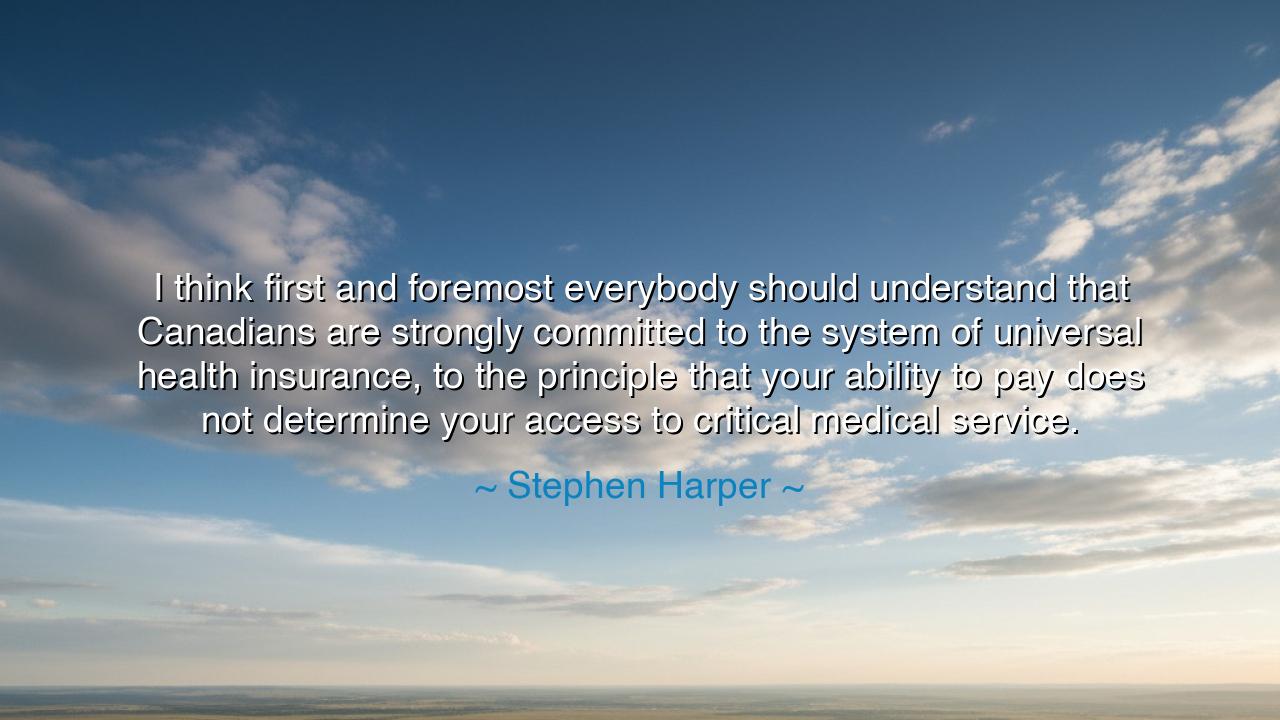
I think first and foremost everybody should understand that
I think first and foremost everybody should understand that Canadians are strongly committed to the system of universal health insurance, to the principle that your ability to pay does not determine your access to critical medical service.






In the solemn yet resolute words of Stephen Harper, there rings a truth that speaks to the heart of a nation’s conscience: “I think first and foremost everybody should understand that Canadians are strongly committed to the system of universal health insurance, to the principle that your ability to pay does not determine your access to critical medical service.” These are not words of politics alone — they are a reaffirmation of moral order, a declaration that compassion must guide civilization as surely as law or power. For what greater mark of humanity is there than this — that the weak and the poor may find healing not by wealth, but by right?
The meaning of this statement runs deeper than the structure of policy. It speaks of equality before suffering, the ancient recognition that illness is the great leveler of all men and women. Whether king or laborer, merchant or farmer, all are humbled when the body fails. In such moments, justice demands that no one be left behind for want of coin. Harper’s words remind us that a society is not measured by the luxury of its few, but by the mercy it grants to its many. To care for the sick without discrimination is to mirror the eternal ideal of shared humanity — that no one is worthless in the eyes of the community.
The origin of this principle lies deep in the Canadian soul, forged in the mid-20th century by the dreamers who birthed Medicare, the system of universal healthcare that became a source of pride and identity for generations. It was the work of Tommy Douglas, a man of humble origins, who once watched his own family suffer for lack of money to pay a doctor. Out of that pain, he conceived a vision: that no child should suffer because their parents were poor, and no elder should die because their purse was empty. His idea was not born in comfort, but in compassion — and it grew into a covenant between citizens, one that Harper’s words reaffirm: that health is not a privilege, but a right.
History, too, bears witness to the consequences when mercy is denied. In the days of the ancient city-states, when pestilence struck Athens, it was said that the rich fled to the hills while the poor died in the streets. Their temples filled with offerings, but their hearts were barren of pity. And the gods, so the poets tell us, turned their gaze away. Yet contrast this with the early Christians of Rome, who in times of plague stayed behind to tend to the sick — even their enemies. They won no gold, no power, yet their compassion outlasted empires. So too, the principle Harper invokes stands as a moral fortress against the cold arithmetic of greed.
In Harper’s words, there is also unity — for he speaks not of government decree, but of the will of the people. “Canadians are strongly committed,” he says, not because they are commanded to be, but because they have chosen to be. This reveals something profound: that compassion, once practiced, becomes tradition; and tradition, once cherished, becomes identity. In Canada, the healing of one is the duty of all, and the doctor’s hand becomes the hand of the nation itself. It is a quiet heroism — not the valor of battle, but the valor of empathy.
Yet we must not think that such a system sustains itself without care. Like any noble institution, universal healthcare must be guarded from complacency, defended from neglect, and nourished by gratitude. For if ever a people begin to see healing as mere entitlement rather than shared virtue, the spirit that sustains it will wither. The duty of every citizen, then, is not only to receive care, but to uphold compassion — to support the systems, the workers, and the values that make such care possible.
Let this be the lesson drawn from Harper’s words: a just society is one where mercy is policy, and dignity is universal. Do not measure civilization by its wealth, but by its tenderness; not by the height of its towers, but by the breadth of its compassion. Let those who are strong give without pride, and those who are weak receive without shame. For in the circle of care, giver and receiver become one — each preserving the humanity of the other.
And so, when you hear these words — “your ability to pay does not determine your access to critical medical service” — remember that they are not only the principles of a nation, but the commandments of conscience. They remind us that healing is sacred, that life is shared, and that the truest strength of any people lies not in the walls they build, but in the hands they extend.






AAdministratorAdministrator
Welcome, honored guests. Please leave a comment, we will respond soon